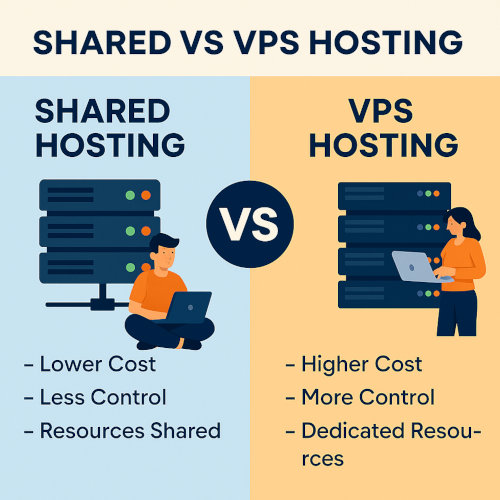Shared Hosting vs. VPS Hosting: Which Is Better for Your Business?
Choosing the right web hosting plan can significantly impact your website's speed, performance, and scalability. Many business owners often find themselves stuck between shared hosting and VPS hosting. In this post, we'll compare both options in detail to help you decide which is better suited for your business in 2025 and going forward.

Understanding Web Hosting Options
When launching a website, selecting the right type of web hosting is a critical decision. Two of the most common types are shared hosting and Virtual Private Server (VPS) hosting. Each comes with its own benefits, limitations, and ideal use cases. Knowing the differences helps you make an informed choice based on your budget, traffic expectations, and technical needs.
What Is Shared Hosting?
Shared hosting means your website shares a single physical server and its resources with many other websites. It's like living in an apartment complex where multiple residents use the same amenities. It's affordable and user-friendly, making it an excellent choice for beginners and small websites.
Advantages of Shared Hosting
- Cost-effective: It is the most budget-friendly hosting type available.
- Easy setup: Hosting providers often offer one-click installations and control panels like cPanel.
- Maintenance-free: The hosting company manages server maintenance and updates.
Drawbacks of Shared Hosting
- Limited resources: All websites share RAM, CPU and disk space, which can lead to slow performance during traffic spikes.
- Security risks: If one site is compromised, others on the server may also be vulnerable.
- Lack of customization: You have limited access to server settings or configurations.
What Is VPS Hosting?
VPS hosting is a step up from shared hosting. You still share a physical server with others, but you get a virtualized environment with dedicated resources. It's similar to living in a townhouse-you still share the property, but you have your own space and utilities.
Advantages of VPS Hosting
- Dedicated resources: You get your own portion of server resources, leading to better performance.
- Greater security: Isolated environments mean other websites can't affect yours.
- Customization: You can install your own software and make server-level changes as you need.
Drawbacks of VPS Hosting
- More expensive: VPS hosting costs more than shared hosting.
- Requires technical knowledge: You may need to manage server configurations or hire someone to do it.
- Maintenance responsibilities: With more control comes more responsibility for keeping the server secure and up-to-date.
Performance Comparison
One of the biggest differences between shared and VPS hosting lies in performance. VPS hosting typically outperforms shared hosting in terms of speed, uptime, and reliability. If your website experiences moderate to high traffic or runs complex applications, a VPS might be the better fit. For smaller, static sites, shared hosting may be sufficient.
Security Considerations
Security is another area where VPS hosting wins. Shared hosting environments are more vulnerable because multiple sites use the same server. A vulnerability in one site can compromise others. VPS hosting offers more isolation and allows you to implement advanced security configurations, including custom firewalls and malware scanners.
Scalability for Growing Businesses
If you expect your business to grow rapidly, VPS hosting offers the scalability to keep up. You can easily upgrade resources without migrating to a new server. Shared hosting is less flexible, often requiring a complete switch to a new plan or provider when your needs increase.
Ease of Use
Shared hosting is easier to manage for beginners. Most plans come with intuitive dashboards, automated updates, and minimal need for technical skills. VPS hosting offers more control but also demands more expertise. Many hosts now offer managed VPS solutions to bridge this gap, but they come at a higher cost.
Cost Comparison
Pricing is usually the deciding factor for many users. Shared hosting plans can start as low as $3–$5 per month, making them ideal for personal blogs or small sites. VPS hosting usually starts around $10–$20 per month, and managed plans can go even higher. It's crucial to weigh the extra cost against the value of increased performance and control.
Who Should Choose Shared Hosting?
- Individuals or small businesses with limited traffic.
- Sites with basic content and limited functionality.
- Users looking for a cost-effective, hassle-free setup.
Who Should Choose VPS Hosting?
- Growing businesses with increasing traffic demands.
- Web developers or tech-savvy users needing full control.
- Sites handling sensitive user data or complex apps.
Other Factors to Consider
Besides features and pricing, consider your level of technical experience and how much time you want to invest in server management. If you're comfortable with shell access and server configurations, VPS hosting may be worth the investment. Otherwise, shared hosting or a managed VPS might be a better fit.
Final Thoughts
Both shared and VPS hosting have their places in the web hosting world. If you're launching a personal blog, small portfolio, or brochure site, shared hosting offers a simple and affordable entry point. But if you're running an ecommerce site, web application, or growing business, the added reliability and flexibility of VPS hosting could pay off in the long run. Choose based on your goals, technical skills and budget, and don't be afraid to upgrade as your needs evolve.
